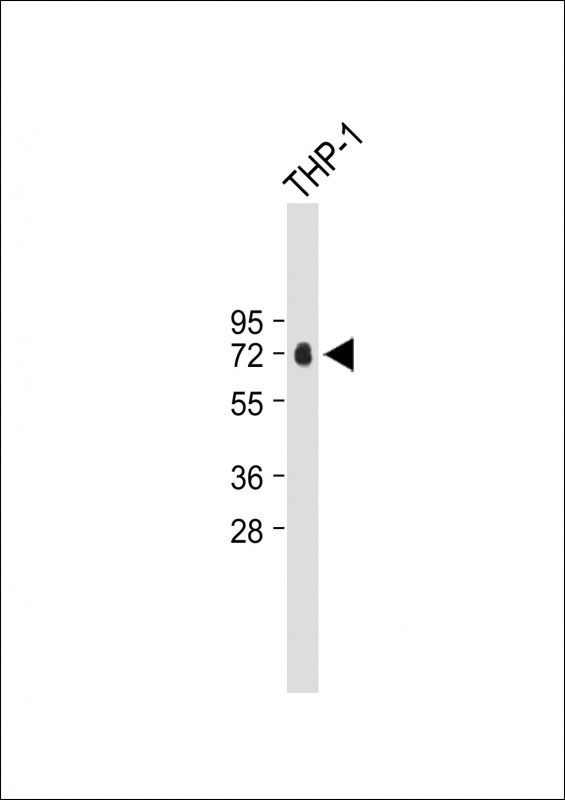CFP Antibody (Center)
Affinity Purified Rabbit Polyclonal Antibody (Pab)
- SPECIFICATION
- CITATIONS
- PROTOCOLS
- BACKGROUND

Application
| WB, FC, E |
|---|---|
| Primary Accession | P27918 |
| Reactivity | Human |
| Host | Rabbit |
| Clonality | Polyclonal |
| Isotype | Rabbit IgG |
| Calculated MW | 51276 Da |
| Antigen Region | 197-223 aa |
| Gene ID | 5199 |
|---|---|
| Other Names | Properdin, Complement factor P, CFP, PFC |
| Target/Specificity | This CFP antibody is generated from rabbits immunized with a KLH conjugated synthetic peptide between 197-223 amino acids from the Central region of human CFP. |
| Dilution | WB~~1:500 FC~~1:10~50 |
| Format | Purified polyclonal antibody supplied in PBS with 0.09% (W/V) sodium azide. This antibody is purified through a protein A column, followed by peptide affinity purification. |
| Storage | Maintain refrigerated at 2-8°C for up to 2 weeks. For long term storage store at -20°C in small aliquots to prevent freeze-thaw cycles. |
| Precautions | CFP Antibody (Center) is for research use only and not for use in diagnostic or therapeutic procedures. |
| Name | CFP |
|---|---|
| Synonyms | PFC |
| Function | A positive regulator of the alternate pathway (AP) of complement (PubMed:20382442, PubMed:28264884). It binds to and stabilizes the C3- and C5-convertase enzyme complexes (PubMed:20382442, PubMed:28264884). Inhibits CFI-CFH mediated degradation of Complement C3 beta chain (C3b) (PubMed:31507604). |
| Cellular Location | Secreted |

Thousands of laboratories across the world have published research that depended on the performance of antibodies from Abcepta to advance their research. Check out links to articles that cite our products in major peer-reviewed journals, organized by research category.
info@abcepta.com, and receive a free "I Love Antibodies" mug.
Provided below are standard protocols that you may find useful for product applications.
Background
This gene encodes a plasma glycoprotein that positively regulates the alternative complement pathway of the innate immune system. This protein binds to many microbial surfaces and apoptotic cells and stabilizes the C3- and C5-convertase enzyme complexes in a feedback loop that ultimately leads to formation of the membrane attack complex and lysis of the target cell. Mutations in this gene result in two forms of properdin deficiency, which results in high susceptibility to meningococcal infections.
References
Seitsonen, S., et al. Mol. Immunol. 47(6):1334-1336(2010)
Chapuis, J., et al. Mol. Psychiatry 14(11):1004-1016(2009)
Wolf-Schnurrbusch, U.E., et al. Retina (Philadelphia, Pa.) 29(7):966-973(2009)
Keslar, K., et al. Transplantation 86(9):1319-1321(2008)
Hartmann, S., et al. J. Biol. Chem. 275(37):28569-28574(2000)
If you have used an Abcepta product and would like to share how it has performed, please click on the "Submit Review" button and provide the requested information. Our staff will examine and post your review and contact you if needed.
If you have any additional inquiries please email technical services at tech@abcepta.com.













 Foundational characteristics of cancer include proliferation, angiogenesis, migration, evasion of apoptosis, and cellular immortality. Find key markers for these cellular processes and antibodies to detect them.
Foundational characteristics of cancer include proliferation, angiogenesis, migration, evasion of apoptosis, and cellular immortality. Find key markers for these cellular processes and antibodies to detect them. The SUMOplot™ Analysis Program predicts and scores sumoylation sites in your protein. SUMOylation is a post-translational modification involved in various cellular processes, such as nuclear-cytosolic transport, transcriptional regulation, apoptosis, protein stability, response to stress, and progression through the cell cycle.
The SUMOplot™ Analysis Program predicts and scores sumoylation sites in your protein. SUMOylation is a post-translational modification involved in various cellular processes, such as nuclear-cytosolic transport, transcriptional regulation, apoptosis, protein stability, response to stress, and progression through the cell cycle. The Autophagy Receptor Motif Plotter predicts and scores autophagy receptor binding sites in your protein. Identifying proteins connected to this pathway is critical to understanding the role of autophagy in physiological as well as pathological processes such as development, differentiation, neurodegenerative diseases, stress, infection, and cancer.
The Autophagy Receptor Motif Plotter predicts and scores autophagy receptor binding sites in your protein. Identifying proteins connected to this pathway is critical to understanding the role of autophagy in physiological as well as pathological processes such as development, differentiation, neurodegenerative diseases, stress, infection, and cancer.



